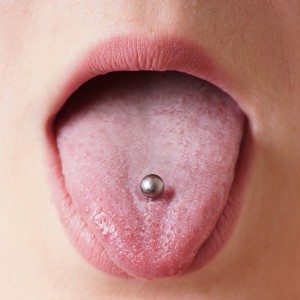The Whole Picture Of Oral Piercings
by Dr. Rita Dargham D.M.D.
Read The Whole Picture Of Oral Piercings by Dr. Rita Dargham D.M.D. to learn more about Grove Smiles® Dentistry and our Dentistry office in Coconut Grove, FL.
We look forward to serving you! Call - 305-858-0505.
As you know in our office, we love to celebrate art and self-expression. Today that freedom of self-expression can be seen everywhere from writing, fashion to the most recent trend of body piercings. However, when it comes to piercings such as lip, labret, cheek, and tongue piercings, it is important to know all of the risks involved with this sort of self-expression.

Understanding the Risks
Although body piercings have become a popular trend, make sure that you know that piercing anywhere near the mouth is very different than a piercing placed on an earlobe. The reason that it is different is that your mouth is home to a plethora of bacteria as well as an intricate system of nerves and blood vessels.
Due to this reason, here are just a few health-related risks associated with oral piercings.
1. Bacterial infection – The mouth hosts vast amounts of bacteria and is thus easily infected. If the piercing is created with nonsterile tools or if the wound is not properly taken care of, bacterial infections–and even secondary infections like hepatitis and herpes simplex virus–can develop.
2. Damage to teeth and gums – Contact between teeth and jewelry leads to tooth enamel erosion and often cracked or chipped teeth. Irreversible gum recession is also a common side effect of oral piercings, which may result in tooth sensitivity and even tooth loss.
3. Difficulty with speech, swallowing and chewing – Oral piercings can cause an increase in saliva production, sometimes making speech difficult. Tongue piercings, in particular, have been known to swell, too, potentially hindering normal function and blocking the airway.
4. Allergic reactions – Allergic reactions to the metal in the jewelry are possible, especially if the surgical-grade stainless steel is not used.
5. Nerve damage or prolonged bleeding – This condition is most often in relation with tongue piercings. Because the tongue is a muscle, it contains a lot of nerves and blood vessels, including arteries. Movement problems or numbness and loss of sensation at the site of the piercing can occur if nerves are damaged. Unfortunately, if a blood vessel is punctured, bleeding can be severe and hard to control.
6. Gum disease – Oral piercings put the trendsetter at greater risk for periodontal, or gum disease. Gum disease can lead to tooth and bone loss, and some studies have even associated gum disease with other health conditions such as diabetes and stroke.
Ready To Help!
If you or your young adult chooses to express themselves with oral piercings, do it the right way. Understand the risks, make sure the procedure is performed by a trained professional who uses sterile instruments and most importantly consult with your dentist before getting an oral piercing to learn proper aftercare and maintenance that will help you reduce your risk of infection or complication.
Your family’s health matters to us at Grove Smiles Dentistry in Coconut Grove, FL. Please feel free to contact us with any questions concerning this post or an existing oral piercing.
We are always happy to hear from our awesome patients!
For Your Health,
Dr. Rita Dargham D.M.D.










